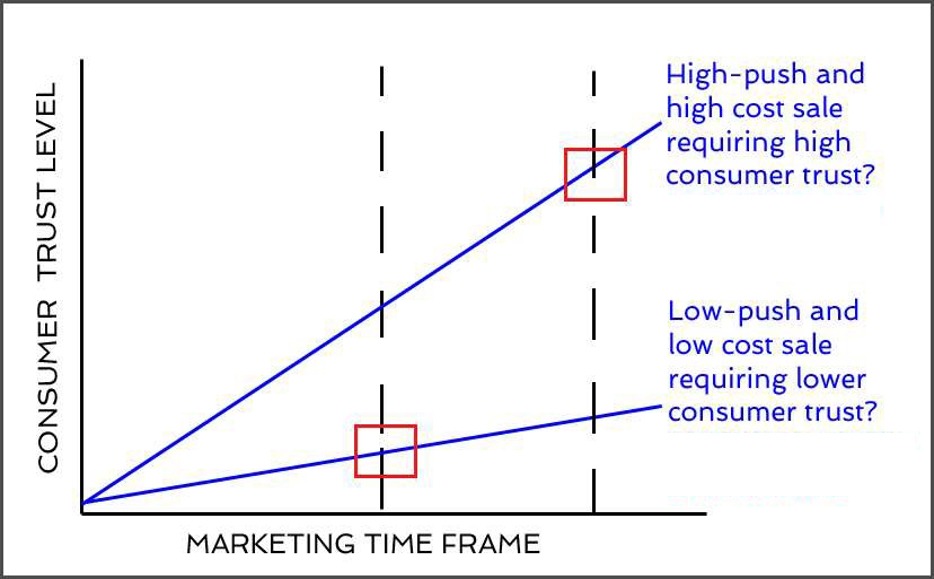Customer conversion looks like a massive and difficult exercise to small businesses, but it’s less daunting than you think. In fact, it’s very much easier for small businesses to convert prospective customers into actual customers if a small bit of customer psychology is brought into play. I have heard many small businesses lament that the long gestation times involved in content marketing can kill their small and meagre starting budgets and leave them with no income for overly long periods as they try to keep up their patience and motivation. But the good news is that the wait needn’t be as long or hard on your finances, or drain your excitement and happiness, if you can strategize differently on the goals for your business! Read on …
The big secret of the small sales … learn this lesson and never forget it!
In digital marketing, there’s is this beautiful concept called the “tripwire”. It’s the analogy that comes from the electrical world described as “… a wire stretched close to the ground, working a trap, explosion, or alarm when disturbed and serving to detect or prevent people or animals entering an area.” The military also uses the word tripwire to describe “… a comparatively weak military force employed as a first line of defence, engagement with which will trigger the intervention of stronger forces.”
In other words, you, as a small brand marketer don’t have to wait to nurture and woo and cajole your potential target audiences for long, fallow periods to sell them your big product or service … you can aim to sell them small opening products that reset their mental image of you and themselves and your relationship! Just like a tripwire helps put people into a state of mind ready for the “bigger thing”, a series of small sales, slowly growing in price-points, will help bridge that trust deficit so fast, that you will wonder why people say it takes so long to build trust!
Think of a Tripwire like dating. If you ask a girl or a guy, a random stranger to marry you, what do you think they’re going to say? Chances are they’re going to end up saying no. If they say no, or if they actually say yes, there’s something wrong. But the reason they’re going to say no, is because they don’t even know you. But if you ask a random stranger, “Hey would you like to go out for coffee?” There’s a much higher chance that they’ll say yes. And if the coffee date goes well, then you may ask them for dinner, and if the dinner date goes well, you may go on a few more dates, do a few things with them.
Then you may end up moving in together, then fast forward a few months, then you may continue dating for a year or two. And then if you ask them to marry you, the chances of them saying yes are much higher. It’s “micro commitments”. By getting people to take small little actions, you’re much more likely to get them to say yes to your big core offer. A good example of a business who does this is Pizza Hut. I remember when I was 13 years old, there were commercials all over TV for two toppings—any toppings that you want—at pizza hut for $7.99.
When I was a little kid, I used to order Pizza Hut because that was such a good deal. Sure, they may not be making that much money of that pizza or that offer, but if you fast forward I’m over 30 years old now, I’ve spent thousands of dollars at Pizza Hut because of that initial offer. That Tripwire, which is a “microcommitment”, got me in and now I’m spending much more money with that business. After the Tripwire, you want to sell them on your core offer.
Here’s a simple diagram that shows you how trust and sales and the time factor are linked. In the shorter duration, you need less customer trust to sell small things. But the important thing is that by changing the “prospective customer” into an “actual customer” you’ve changed the nature of the relationship you have with him. You’ve also changed his perception of himself in relation to you, his perception of his experience in dealing with you, and his sense of “status” in your eyes. As time grows, you can have more and more trust built up – enough trust to make that bigger sale.

Contrast this approach with the usual tactic that people in digital marketing advocate. Don’t people tell you that you have to give loads of free information which will eventually lead to trust in your content, and then trust in you, and finally trust in your big product? Just think for a moment whether this approach of a “freebie” will change the mind-set of the potential customer in any way? Will this approach help your finances in any way? And finally, will this approach create any real experience of dealing with you in a financial transaction – which is where the rubber hits the road and a customer gets hand-on experience of dealing with you “with security” rather than just downloading a freebie?
4 big changes that happen in a prospective customer’s mind when he becomes a “customer” of yours!
The customer stops comparison-shopping and grows towards brand loyalty with greater ease!
One of the big plus-points of getting a customer to buy smaller products from you before getting mentally ready to buy your flagship service or product is that with every “sale”, brand loyalty starts kicking in. Notice how even with a brand of toothpaste, you get into the habit of mindlessly buying the same brand unless competition is particularly aggressive in making you change your mind. People are creatures of habit and brand loyalty too is a form of habit. Habits require less brain application and feel easier to do because you know the rigmarole involved in the process of buying. So if you strategize to sell small things to a customer and thus deepen the bond with the customer (as against offering a series of freebies, say) you get the brand loyalty factor beginning to work in your favour.
Let’s take an example here: let’s say you have a software tool you’d like to sell which is your premium product. Now you may be tempted to offer a free ebook on the same topic that your software addresses, but after reading the ebook what are the guarantees the customer feels any loyalty to your product to want to invest in it? On the contrary, if you were to sell your ebook for a very small sum (say, just at a price of about $3 to $5), if the customer is really interested you will, firstly, get a surer signal that he’s in for a “buy”. Secondly, he will tend to want to validate his investment of that $5 … it’s human nature to self-justify even the smallest expenditure! He will therefore get into the loop of searching the ebook for reasons why the software would be ideal to buy, so that his $5 spent was really worth it. He will start looking for reasons “why” and not reasons “why not”. And when he starts looking at your product with these “positive blinkers” on, he will stop comparison shopping, because after spending the initial amount on your brand, it seems like he’s throwing out his own investment – and has to begin all over again with someone else and his re-investment with that brand.
Trust is a progressive emotion and you can help create the trust continuum in the customer!
After you have sold your first small product, it pays to keep the momentum going with your “customer”. With every progressive sale, trust increases, and with every sale at a slightly higher price than before, trust also increases proportionately. You may want to start with a few low-priced e-books, then offer a slightly higher-priced online course, then a bigger priced webinar … and before you know it, the customer may be ready to invest in a much bigger purchase with you. It is entirely up to you to have enough products created at various price-points if you want to keep the hold on the customer. You want him to stay in the buying cycle with you and get into a relationship that progressively feels more and more satisfying and self-validating! (Of course, you also have to ensure that every buying experience is top-notch!)
The customer no longer needs external validation when he has first-hand experience dealing with you!
This is a simple but very important point. Most people these days look for external validation of their brand purchases – like from the social media or their online network of friends and peers. So long as a person is not yet your “customer” he will look for external validation and even tend to agree with negative opinions as a form of self-restraint. But the minute he becomes a customer, no matter even if it’s a very tiny product bought from you, he will no longer want to hear contra-opinions that he has made a poor choice. He is not defending your product against criticism, he is defending his own actions against criticism. So this is a very smart way for marketers to inure their customers against getting brainwashed against their products by the social circles.
You can help the customer progressively shorten his buying cycle with every small purchase!
Very few marketers realize that the buying cycle is tedious even for the customer. When he has to make big ticket purchases, there is a lot of effort needed even from his side on research, testing and trials, forming good decisions and setting out budgets. The buying cycle often wearies marketers, but they need to realize it wearies buyers even more. Customers often find themselves trapped in a cycle of their own expectations which becomes arduous. Think of yourself. How often have you been frustrated by your own meandering as a buyer going through a buying process?
When you offer tripwire products as small sales, you help the customer shorten his buying cycle, because “an ounce of practice is worth a ton of theory”. The customer realises that by going through the small sale he has settled in his own mind many niggling doubts that may have called for a lot of reading and research on many vendors and their products and their reliability and their credibility. You have answered his doubts and queries with a product rather than by an endless to and fro via reading many blog posts and endless emails. Try this tripwire sales approach and you will find customers will be silently grateful for the small opportunities you are giving them that make it so much easier to make big decisions.
It’s natural for marketers to ask: Can a small product worth about $5 make such an impact on a customer? I know that skeptics will find it hard to believe, as will most customers themselves … but this behavior is psychologically true, apparently, even if a buyer will never admit to it and a marketer may not readily buy into it.
If nothing else, at least the next time you think of offering a freebie as a bribe, you will ponder about what you could be missing. You could be losing your small but important opening to create a “customer”!
Selling small things can lead to big success! Master the art of marketing and sales with Delhi Courses Academy’s Digital Marketing Course in Delhi. Learn SEO, social media, PPC, and more.

Delhi Courses Academy is a leading institute offering the best digital marketing course in Delhi, known for its practical training, affordable fees, and industry-focused curriculum. With 15+ certifications, 100% placement assistance, and hands-on projects, it prepares students for real-world challenges.


